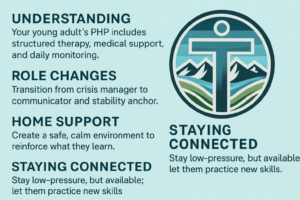When your young adult is in the middle of a behavioral health crisis, it can feel like your whole life has been rearranged around their pain. You’re still doing the everyday things—grocery shopping, answering emails, paying bills—but part of you is constantly scanning for danger signs. Are they safe? Are they using again? Are they even willing to try?
When things reach a breaking point, a Partial Hospitalization Program (PHP) can be a lifeline. It provides daily, structured treatment without requiring your loved one to live at the facility full-time. That balance can help stabilize the crisis while keeping them connected to the reality of life outside treatment.
Your role during PHP changes, but it remains critical. This guide walks you through what to expect, how to help, and where to turn for your own support along the way.
Understanding What PHP Offers
A PHP is an intensive day treatment program—usually five days a week for 4–6 hours each day. It provides:
- Structured therapy through individual sessions, group work, and skills training.
- Medical support for mental health conditions and, in some cases, substance use disorders.
- Daily monitoring without overnight stays.
Compared to inpatient care, PHP allows your loved one to live at home (or in a sober living setting) while still receiving high-level support. Compared to weekly therapy, it offers more structure, consistency, and safety for someone in crisis.
How Your Role Changes During PHP
In the thick of a crisis, parents often operate in rescue mode—managing every variable, reacting to every shift in mood or behavior. PHP takes on part of that role, but you remain a key part of your loved one’s stability.
Your role becomes:
- Communicator: Share helpful updates with staff—changes in behavior, medication concerns, or home stressors.
- Supporter, not fixer: Encourage attendance, but allow the clinical team to take the lead on treatment decisions.
- Stability anchor: Maintain a predictable, calm home environment to reinforce what they’re learning in treatment.
Sometimes, the best thing you can do is step back just enough for them to practice new skills, while staying close enough to offer stability if they wobble.
Creating a Home That Supports Recovery
Evenings and weekends are where PHP “meets” real life. What happens outside treatment hours can either reinforce their progress or undermine it.
Ways to make home a safer, calmer place:
- Reduce chaos: Keep routines predictable—meals at regular times, chores split evenly, bedtime consistent.
- Limit triggering situations: This might mean removing alcohol from the home, limiting visits from certain friends, or avoiding heated debates right after treatment.
- Offer quiet space: A room or corner where they can decompress after a long treatment day.
- Keep communication low-pressure: Some days, the most supportive thing you can say is, “Glad you’re home. Dinner’s at 6.”
Staying Connected Without Hovering
It’s natural to want constant updates. You’ve been living on high alert for so long that relaxing feels risky. But part of PHP’s goal is to help your loved one build self-management skills—and that requires some breathing room.
Instead of rapid-fire check-ins, try open-ended questions:
- “What was one useful thing you learned today?”
- “Is there anything I can do tonight to make things easier?”
- “Do you want to talk about your day, or do you just want to rest?”
This approach says, I’m here if you need me, without demanding more than they can give.

Taking Care of Your Own Wellbeing
Parents often overlook their own needs during a crisis. But PHP isn’t just an opportunity for your loved one—it’s a window for you to breathe, reflect, and recover some strength.
Consider:
- Joining a support group for parents of young adults in treatment.
- Attending your own therapy to process the stress, fear, and fatigue you’ve been carrying.
- Reconnecting with activities you’ve set aside—reading, walking with friends, working on a hobby.
Your stability supports theirs. When you take care of yourself, you have more patience, energy, and clarity to show up for them.
Navigating Common Challenges for Parents During PHP
Even with a treatment team involved, there are challenges that can strain your hope and resolve.
They resist going: Expect some pushback on tough days. Stay consistent in encouraging attendance, and lean on the clinical team for strategies.
You feel left out: PHP is designed to center the client’s experience. While family involvement is important, some details may remain confidential to build trust between your loved one and the treatment team.
Progress feels slow: Healing doesn’t happen in a straight line. There may be breakthroughs one week and setbacks the next. Trust the process and keep communicating with staff.
Making the Most of Family Sessions
Many PHPs include family therapy or education sessions. These are not just for updates—they’re opportunities to:
- Learn new communication strategies
- Understand boundaries and roles
- Ask questions about what’s happening in treatment
- Practice problem-solving with a clinician present
Even if your loved one resists at first, consistent participation can shift the family dynamic in a healthier direction.
FAQs About Supporting a Loved One in PHP
Do I need to be available every day during PHP?
Not necessarily. The treatment team handles the day-to-day care during program hours. Your focus should be on evenings, weekends, and communicating important updates.
Should I attend all family sessions?
Yes, when offered. They can help you align your approach with the treatment team’s and build a united front.
What if my loved one refuses to attend?
Contact the treatment team immediately. They can advise on how to handle resistance and keep momentum.
Can I contact staff directly with concerns?
Yes, though there may be boundaries about what information can be shared with you, depending on your loved one’s age and consent.
How will I know when PHP is working?
Look for small shifts: better communication, more consistent attendance, and moments of self-awareness. The team will also keep you informed about progress.
Knowing Local Resources
Having local options means you can stay actively involved without adding travel stress. If you’re looking for a Partial Hospitalization Program in Henderson, NV, North Las Vegas, or surrounding areas, Titan Behavioral Health offers programs designed for crisis stabilization, skill-building, and ongoing recovery.
Our team works with both clients and families, because we know you’re not just a bystander in their healing—you’re part of the foundation.
Ready to Take the Next Step?
Call (888) 976-8457 or visit our Partial Hospitalization Program services in Las Vegas, Nevada to learn more. Whether your loved one is just entering treatment or continuing care, we’ll help you both navigate what’s next.

